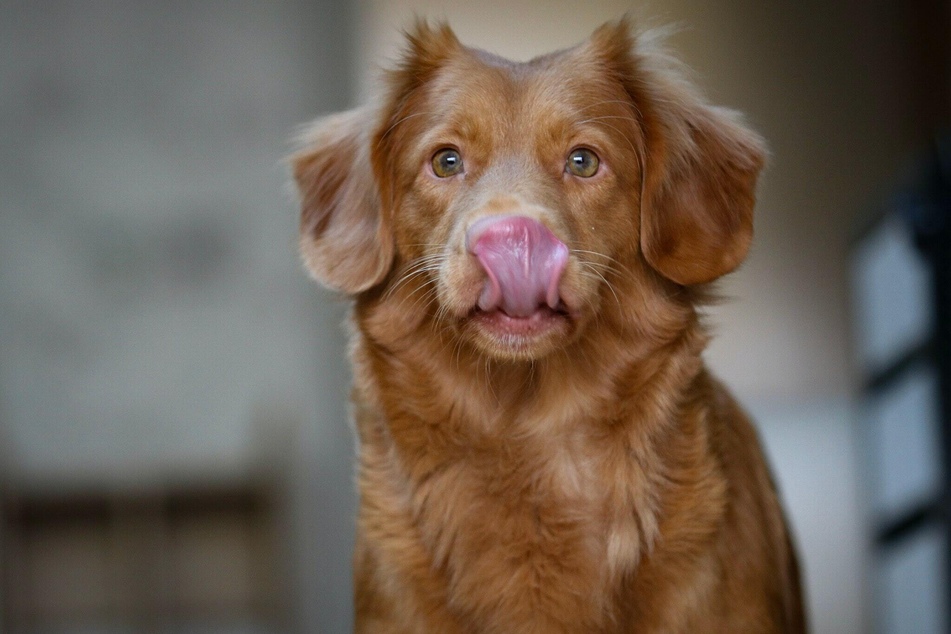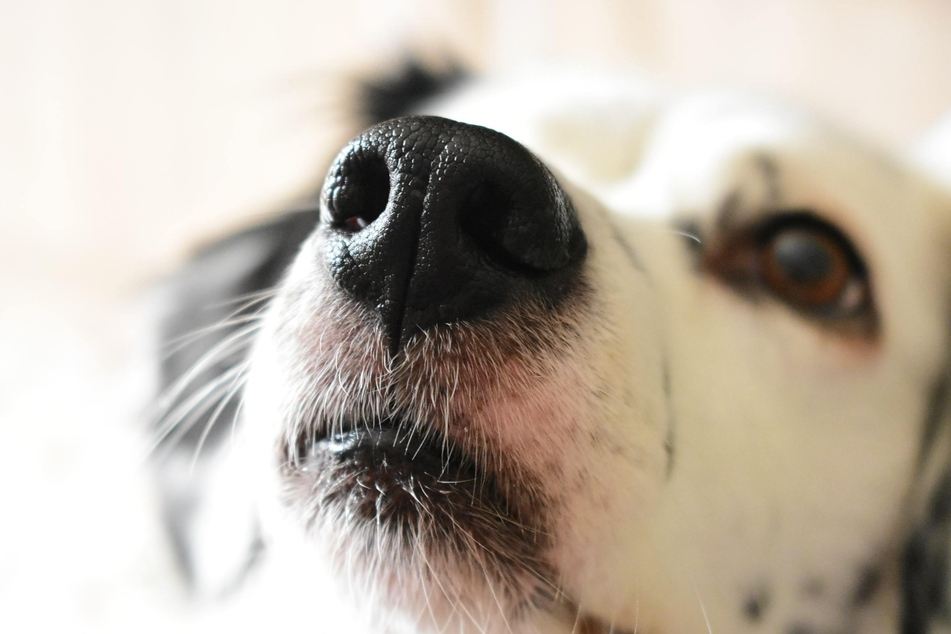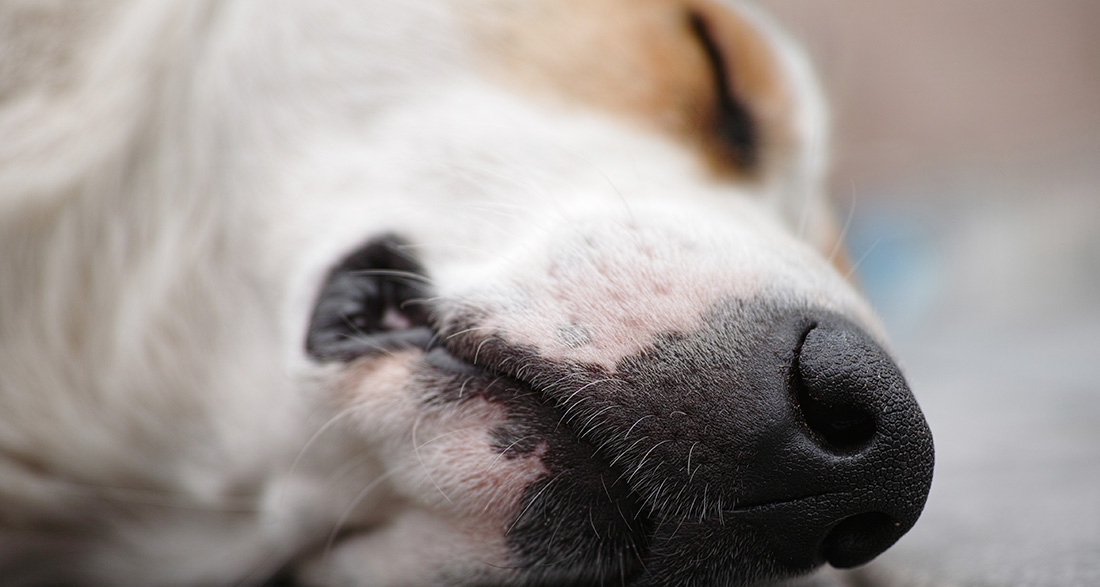Healthy dogs always have a moist and cool nose—or so some dog owners believe. iHugDogs explains whether this assumption is accurate. Find out in the dog guide what a dry and warm nose really means for a dog.
Depending on what a dog is using its nose for at the moment, its temperature and moisture level change multiple times throughout the day.
A moist nose enables dogs to smell more intensely, as odor molecules dissolve better in humid air than in dry air. Additionally, moisture helps them locate the scent by sensing the direction from which the air is coming.
The dog’s nose, being its most important sensory organ, also serves other functions, such as regulating body temperature to some extent through the nose, which is why it can be warm after exercise and other activities.
A dry and warm nose as the sole symptom is, in most cases, not an indication of a serious illness in dogs.
Causes of a dry nose in dogs

Apart from the fact that a dog’s nose moisture varies throughout the day, other factors can contribute to drying out the nose.
Possible causes of a dry and warm dog nose include:
- Low humidity in the room or environment
- Proximity to a heater or another heat source
- Exercise or other physical exertion
- Sleep
- Sunburn
- Insect bite
- Dehydration
- Nutrient and vitamin deficiency
- Breed characteristics
Only when the dog’s behavior changes, it experiences additional symptoms, and a dry nose accompanies these signs does it suggest an illness.

Other symptoms and diseases
The following symptoms, when associated with a dry and warm nose, indicate a serious illness:
- Fever
- Weakness
- Lethargy
- Excessive sleeping
- Loss of appetite, reduced fluid intake
- Decreased defecation and urination or diarrhea
- Pain
- Labored or shallow breathing
- Thick, milky, yellow, or otherwise altered nasal discharge
- Eye discharge
- Crusts, swelling, cracks, redness, blisters, skin flakes on the nose
If the nose remains dry for several days along with the presence of other symptoms, owners should have their dog examined by a veterinarian. It could be a sign of a serious illness in this case.
A dry nose in dogs as a symptom occurs in the following diseases:
- Viral diseases, e.g., nasodigital hyperkeratosis (distemper)
- Allergies
- Autoimmune diseases, e.g., pemphigus foliaceus
- Respiratory diseases or infections
- Hereditary diseases, e.g., ichthyosis
- Nasal parakeratosis (only in Labrador Retrievers)
- Nasal folliculitis (due to insect bites or trauma)
- Dermatomyositis (lilac disease)
- Nasal cancer
These and other diseases cannot be diagnosed by dog owners through self-diagnosis but require examination and treatment by a veterinarian.
Note
A dog has a fever when its body temperature is higher than 104 °F without engaging in physical activity or similar exertion.
Treatment for a dry nose in dogs
If the cause of the dry nose is not an illness, there are small measures that can help the dog.
Dogs should always have access to sufficient fresh water for drinking. It is generally recommended to carry water for the dog on walks and outings. If the air in living spaces is too dry, a humidifier can be used.
Dog noses, especially those with light skin, are very sensitive to sunlight. If the skin on the nose dries out quickly, peels, and becomes red, it should be treated with appropriate creams.
To prevent sunburn, owners should offer their dog shaded and cool places for walking and resting. There are also special sunscreens for dogs.
After every walk, it is advisable to examine the dog’s nose. Any foreign bodies and pests such as ticks should be removed carefully. Insect bites should be monitored and treated if the animal is suffering too much.
Allergies, as well as nutrient and vitamin deficiencies, need to be clarified by a veterinarian. Subsequently, triggering substances can be eliminated or the dog’s diet adjusted accordingly.

The use of home remedies or medications should only be done after consulting the veterinarian and discussing the appropriate treatment.
Crusts and other wound closures on the dog’s nose should never be forcefully removed by dog owners. If necessary, the dog’s nose can be gently dabbed with lukewarm water.
Home remedies for a dry and cracked nose in dogs
These home remedies help against a dry and cracked nose in dogs:
- Oils, e.g., almond, coconut
- Aloe vera
- Vaseline
- Lip balm sticks with moisturizing properties
The products used should be free of color, fragrance, and other chemical substances. Not every dog tolerates having its nose treated with home remedies. For these dogs and those that are genetically predisposed to a dry nose (e.g., Pug and French Bulldog), veterinarians prescribe special and gentle ointments.
If a dog has a dry nose, it is not necessarily sick. However, if dog owners are unsure whether their dog is healthy, they should have it checked by a veterinarian.


